formerly eScholarship Editions


|
|
|
|
Your search for
Public
in rights
'Psychology' in subject
found 11 book(s). | Modify Search | Displaying 1 - 11 of 11 book(s) | |
| 1. | 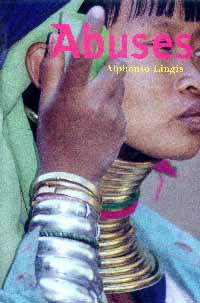 | Title: Abuses Author: Lingis, Alphonso 1933- Published: University of California Press, 1994 Subjects: Philosophy | Literature | Cultural Anthropology | Social and Political Thought | Psychology | Travel Publisher's Description: Part travelogue, part meditation, Abuses is a bold exploration of central themes in Continental philosophy by one of the most passionate and original thinkers in that tradition writing today.A gripping record of desires, obsessions, bodies, and spaces experienced in distant lands, Alphonso Lingis's book offers no less than a new approach to philosophy - aesthetic and sympathetic - which departs from the phenomenology of Levinas and Merleau-Ponty. "These were letters written to friends," Lingis writes, "from places I found myself for months at a time, about encounters that moved me and troubled me. . . . These writings also became no longer my letters. I found myself only trying to speak for others, others greeted only with passionate kisses of parting."Ranging from the elevated Inca citadel of Machu Picchu, to the living rooms of the Mexican elite, to the streets of Manila, Lingis recounts incidents of state-sponsored violence and the progressive incorporation of third-world peoples into the circuits of exchange of international capitalism. Recalling the work of such writers as Graham Greene, Kathy Acker, and Georges Bataille, Abuses contains impassioned accounts of silence, eros and identity, torture and war, the sublime, lust and joy, and human rituals surrounding carnival and death that occurred during his journeys to India, Bangladesh, Thailand, Bali, the Philippines, Antarctica, and Latin America. A deeply unsettling book by a philosopher of unusual imagination, Abuses will appeal to readers who, like its author, "may want the enigmas and want the discomfiture within oneself." [brief] Similar Items |
| 2. | 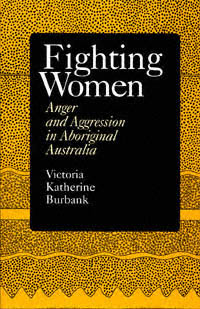 | Title: Fighting women: anger and aggression in Aboriginal Australia Author: Burbank, Victoria Katherine Published: University of California Press, 1994 Subjects: Anthropology | Women's Studies | Psychology Publisher's Description: Fighting is common among contemporary Aboriginal women in Mangrove, Australia - women fight with men and with other women. Victoria Burbank's depiction of these women offers a powerful new perspective that can be applied to domestic violence in Western settings.Noting that Aboriginal women not only talk without shame about their emotions of anger but also express them in acts of aggression and defense, Burbank emphasizes the positive social and cultural implications of women's refusal to be victims. She explores questions of hierarchy and the expression of emotions, as well as women's roles in domestic violence. Human aggression can be experienced and expressed in different ways, she says, and is not necessarily always "wrong." Timely and controversial, Fighting Women will stimulate discussion of aggression and gender relations and will enlarge the debate on the victimization of women and children everywhere. [brief] Similar Items |
| 3. | 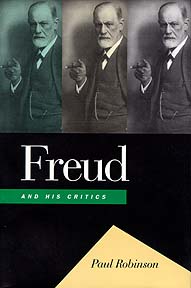 | Title: Freud and his critics Author: Robinson, Paul A 1940- Published: University of California Press, 1993 Subjects: History | Intellectual History | Autobiographies and Biographies | Psychology | Psychiatry Publisher's Description: Wars against Freud have been waged along virtually every front during the past decade. Now Paul Robinson takes on three of Freud's most formidable critics, mounting a thoughtful, witty, and ultimately devastating critique of the historian of science Frank Sulloway, the psychoanalyst Jeffrey Masson, and the philosopher Adolf Grünbaum.Frank Sulloway contends that Freud took most of his ideas from Darwin and other contemporary thinkers - that he was something of a closet biologist. Jeffrey Masson charges that Freud caved in to peer pressure when he abandoned his early seduction theory (which Masson believes was correct) in favor of the theory of infantile sexuality. Adolf Grünbaum impugns Freud's claim to have grounded his ideas - especially the idea of the unconscious - on solid empirical foundations.Under Robinson's rigorous cross-examination, the evidence of these three accusers proves ambiguous and their arguments biased by underlying assumptions and ideological commitments. Robinson concludes that the anti-Freudian writings of Sulloway, Masson, and Grünbaum reveal more about their authors' prejudices - and about the Zeitgeist of the past decade - than they do about Freud.Beautifully crafted and full of surprises, Robinson's work is a compelling defense of one of history's most original and powerful minds. Freud and His Critics will earn an enduring place in the raging Freudian debate. [brief] Similar Items |
| 4. | 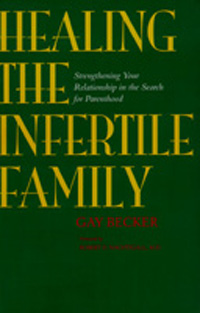 | Title: Healing the infertile family: strengthening your relationship in the search for parenthood Author: Becker, Gaylene Published: University of California Press, 1997 Subjects: Anthropology | Medical Anthropology | Psychology Publisher's Description: Unlike most infertility books that focus on medical treatment, Healing the Infertile Family examines the social and emotional problems experienced by couples confronting infertility and suggests how they can be alleviated. In this updated edition, Gay Becker discusses her most recent study of couple . . . [more] Similar Items |
| 5. | 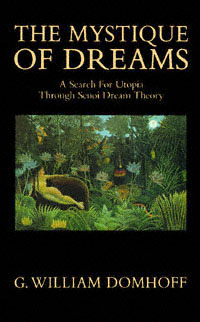 | Title: The mystique of dreams: a search for utopia through Senoi dream theory Author: Domhoff, G. William Published: University of California Press, 1990 Subjects: Sociology | Psychology | Anthropology Publisher's Description: A fascinating strand of the human potential movement of the 1960s involved the dream mystique of a previously unknown Malaysian tribe, the Senoi, first brought to the attention of the Western world by adventurer-anthropologist-psychologist Kilton Stewart. Exploring the origin, attraction, and efficacy of the Senoi ideas, G. William Domhoff also investigates current research on dreams and concludes that the story of Senoi dream theory tells us more about certain aspects of American culture than it does about this distant tribe. In analyzing its mystical appeal, he comes to some unexpected conclusions about American spirituality and practicality. [brief] Similar Items |
| 6. | 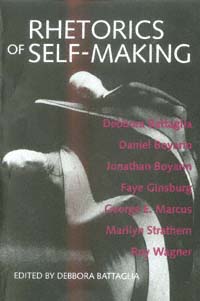 | Title: Rhetorics of self-making Author: Battaglia, Debbora Published: University of California Press, 1995 Subjects: Anthropology | Cultural Anthropology | Psychology Publisher's Description: Departing from an essentialist concept of the self, this highly original volume advances the cross-cultural study of selfhood with three contributions to the literature: First, it approaches the self as an ideological process, arguing that selfhood is culturally situated and emergent in social practices of persuasion. Second, it demonstrates how postmodernity problematizes the experience and concept of the self. Finally, the book challenges the pervasive practice of equating an individuated self with the Western world and a relational self with the non-Western world. Contributions cover a broad range of topics - from the development of the eccentric self to the ritual circumcision of Jewish males. [brief] Similar Items |
| 7. | 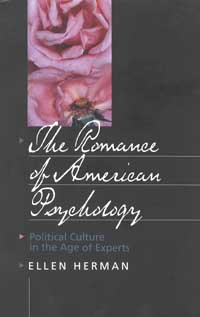 | Title: The romance of American psychology: political culture in the age of experts Author: Herman, Ellen Published: University of California Press, 1995 Subjects: Social Science | American Studies | Politics | Psychology | United States History Publisher's Description: Psychological insight is the creed of our time. A quiet academic discipline two generations ago, psychology has become a voice of great cultural authority, informing everything from family structure to government policy. How has this fledgling science become the source of contemporary America's most potent ideology?In this groundbreaking book - the first to fully explore the political and cultural significance of psychology in post-World War II America - Ellen Herman tells the story of Americans' love affair with the behavioral sciences. It began during wartime. The atmosphere of crisis sustained from the 1940s through the Cold War gave psychological "experts" an opportunity to prove their social theories and behavioral techniques. Psychologists, sociologists, and anthropologists carved a niche within government and began shaping military, foreign, and domestic policy. Herman examines this marriage of politics and psychology, which continued through the tumultuous 1960s.Psychological professionals' influence also spread among the general public. Drawn by promises of mental health and happiness, people turned to these experts for enlightenment. Their opinions validated postwar social movements from civil rights to feminism and became the basis of a new world view. Fascinating and long overdue, this book illuminates one of the dominant forces in American society. [brief] Similar Items |
| 8. | 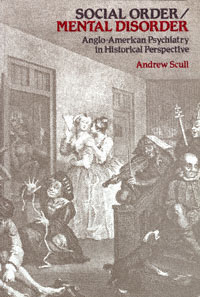 | Title: Social order/mental disorder: Anglo-American psychiatry in historical perspective Author: Scull, Andrew T Published: University of California Press, 1989 Subjects: Sociology | Psychiatry | United States History | European History | Psychology Similar Items |
| 9. | 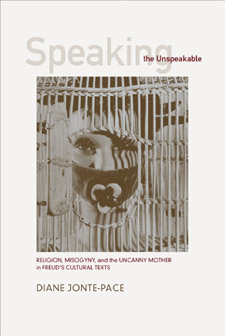 | Title: Speaking the unspeakable: religion, misogyny, and the uncanny mother in Freud's cultural texts Author: Jonte-Pace, Diane E. (Diane Elizabeth) 1951- Published: University of California Press, 2001 Subjects: Religion | Literature | Gender Studies | Jewish Studies | Psychology Publisher's Description: In this bold rereading of Freud's cultural texts, Diane Jonte-Pace uncovers an undeveloped "counterthesis," one that repeatedly interrupts or subverts his well-known Oedipal masterplot. The counterthesis is evident in three clusters of themes within Freud's work: maternity, mortality, and immortality; Judaism and anti-Semitism; and mourning and melancholia. Each of these clusters is associated with "the uncanny" and with death and loss. Appearing most frequently in Freud's images, metaphors, and illustrations, the counterthesis is no less present for being unspoken--it is, indeed, "unspeakable." The "uncanny mother" is a primary theme found in Freud's texts involving fantasies of immortality and mothers as instructors in death. In other texts, Jonte-Pace finds a story of Jews for whom the dangers of assimilation to a dominant Gentile culture are associated unconsciously with death and the uncanny mother. The counterthesis appears in the story of anti-Semites for whom the "uncanny impression of circumcision" gives rise not only to castration anxiety but also to matriphobia. It also surfaces in Freud's ability to mourn the social and religious losses accompanying modernity, and his inability to mourn the loss of his own mother. The unfolding of Freud's counterthesis points toward a theory of the cultural and unconscious sources of misogyny and anti-Semitism in "the unspeakable." Jonte-Pace's work opens exciting new vistas for the feminist analysis of Freud's intellectual legacy. [brief] Similar Items |
| 10. | 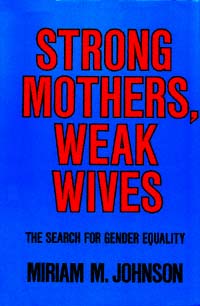 | Title: Strong mothers, weak wives: the search for gender equality Author: Johnson, Miriam M Published: University of California Press, 1988 Subjects: Sociology | Psychology | Women's Studies Publisher's Description: A leading theorist in the sociology of sex and gender, Miriam Johnson establishes as her starting point the belief that inequality is not inherent or inevitable in heterosexual relations. In Strong Mothers, Weak Wives she develops this notion by examining how gender differences get translated into g . . . [more] Similar Items |
| 11. | 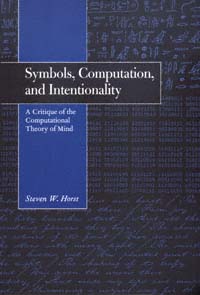 | Title: Symbols, computation, and intentionality: a critique of the computational theory of mind Author: Horst, Steven W 1960- Published: University of California Press, 1996 Subjects: Philosophy | Social and Political Thought | Psychology Publisher's Description: The computational theory of mind - the belief that the mind can be likened to a computer and that cognitive states possess the generative and compositional properties of natural languages - has proven enormously influential in recent philosophical studies of cognition. In this carefully argued critique, Steven Horst pronounces the theory deficient. He refutes its claims and assumptions, particularly the assertion that symbolic representations need not have conventional meaning. Horst goes on to sketch a new methodology for looking at the philosophy of psychology, one that provides a more fruitful way of comparing computational psychology with rival views emerging from connectionism and neuroscience. Original and comprehensive, his book is certain to provoke controversy and stimulate debate. [brief] Similar Items |